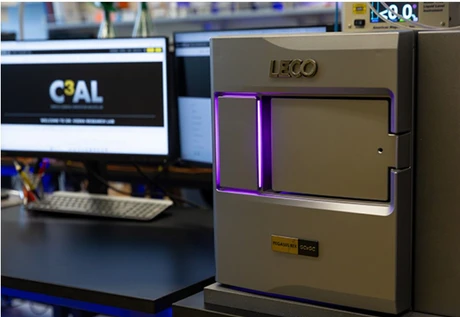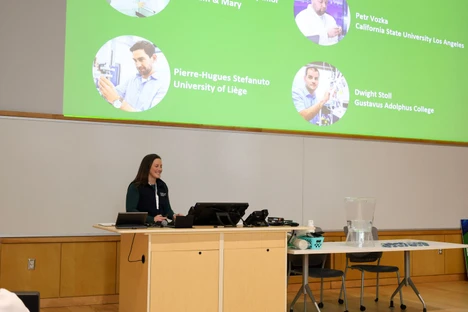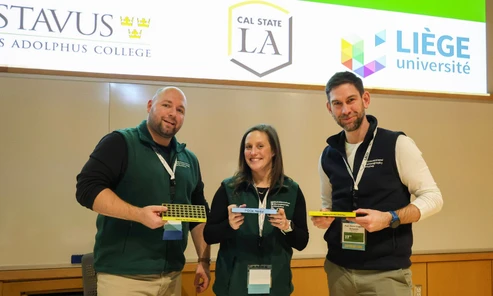
We are a research group in the Department of Chemistry and Biochemistry at California State University, Los Angeles. Our research revolves around the characterization of complex chemical mixtures via state-of-the-art techniques, inlcuding two-dimensional gas chromatography and high-resolution mass spectrometry. Our ultimate objective is to gain a fundamental understanding of how the chemical composition influences the properties of complex chemical mixtures at the molecular level. Additionally, we specialize in the analysis of microplastics, which is an emerging field with important environmental implications. Through our work, we strive to make a positive impact on society by contributing to the development of sustainable solutions.
Lab and Facilities
Our lab and department are equipped with state-of-the-art analytical instruments for analyzing a wide range of samples.
LECO Pegasus BT 4D GCxGC-TOFMS
LECO's GCxGC Time-of-Flight Mass Spectrometer.
_l.webp) Cal State LA: LECO QUADJET GCxGC coupled to Pegasus BT 4D TOM MS in the Complex Chemical Composition Analysis Lab (C³AL)
Cal State LA: LECO QUADJET GCxGC coupled to Pegasus BT 4D TOM MS in the Complex Chemical Composition Analysis Lab (C³AL)
LECO GC×GC-FID
LECO's QuadJet SD Comprehensive Two-Dimensional Gas Chromatography (GC×GC) combined with Flame Ionization Detection (FID).
_l.webp) Cal State LA: LECO QUADJET GCxGC FID in the Complex Chemical Composition Analysis Lab (C³AL)
Cal State LA: LECO QUADJET GCxGC FID in the Complex Chemical Composition Analysis Lab (C³AL)
LECO GC-TOFMS
LECO's Benchtop Gas Chromatography Time-of-Flight Mass Spectrometer Pegasus® BT GC-TOFMS.
 C³AL: Lab and Facilities C³AL group: LECO GC×GC-FID, LECO GC-TOFMS and Agilent GC-MSD-FID
C³AL: Lab and Facilities C³AL group: LECO GC×GC-FID, LECO GC-TOFMS and Agilent GC-MSD-FID
Agilent GC/MSD/FID
Agilent 5977B gas chromatography-mass spectrometry detector (GC/MSD) with EI, a single quadrupole, and split to an FID.
_l.webp) Cal State LA: Agilent GCMSD in the Complex Chemical Composition Analysis Lab (C³AL)
Cal State LA: Agilent GCMSD in the Complex Chemical Composition Analysis Lab (C³AL)
Thermo LC-MS
Exactive™ Plus Orbitrap Mass Spectrometer is a benchtop LC-MS system that delivers high-resolution, accurate-mass (HR/AM) data and fast full-scan capabilities.
LECO L-PAL3 GC Autosampler
L-PAL3 GC Autosampler is capable of liquid, headspace, and SPME injections.
SVM 3001 Cold Properties
Anton Paar SVM 3001 Cold Properties is capable of measuring density, viscosity, cloud point, and freezing point in the temperature range of -60 to
6200 Isoperibol Calorimeter
Parr Instrument Company 6200 Isoperibol Calorimeter is a microprocessor-controlled, isoperibol oxygen bomb calorimeter.
_l.webp) Cal State LA: GCxGC, GC-TOF and GC-MSD systems in the Complex Chemical Composition Analysis Lab (C³AL)
Cal State LA: GCxGC, GC-TOF and GC-MSD systems in the Complex Chemical Composition Analysis Lab (C³AL)
Research
Detailed Analysis of Complex Chemical Mixtures
Complex chemical mixtures (e.g., fuels, environmental air, human breath, pharmaceuticals) are combinations of hundreds or thousands of chemicals, of which the composition is qualitatively and quantitatively not fully known. We use comprehensive two-dimensional gas chromatography (GCxGC) techniques for quantitative and qualitative (targeted and untargeted) analyses of various gas, liquid, and solid samples.
 Research C³AL: Detailed Analysis of Complex Chemical Mixtures and Mapping Biodegradation of Subsurface Oil in Huntington Beach Sands
Research C³AL: Detailed Analysis of Complex Chemical Mixtures and Mapping Biodegradation of Subsurface Oil in Huntington Beach Sands
Mapping Biodegradation of Subsurface Oil in Huntington Beach Sands
In October 2021, a failure occurred in a pipeline connecting the Port of Long Beach to an offshore oil platform resulting in ~140,000 gallons of post-production crude oil being washed up on local beaches. This project aims to study the interactions between beach sands and oil via GC×GC to understand the human health risks from oil-polluted beaches better. This project is funded by the California State University Council on Ocean Affairs, Science & Technology (COAST).
Microplastics Analysis
Microplastics (MPs) are small plastic fragments that are defined as 5 mm in size and below. Due to their extremely small size, they exist in our food, water, and even the air we breathe. Our research aims to qualitatively and quantitatively analyze organic compounds adsorbed on the MPs surfaces via GC-TOFMS and GC×GC-TOFMS using SPME fibers and pyrolysis autosampler. Since MPs are virtually undegradable, understanding the types of compounds adsorbed onto their surfaces will provide a deeper understanding of the toxicity of MPs.
 Research C³AL: Microplastics Analysis and Time since Deposition/Aging Studies for Latent Fingerprints
Research C³AL: Microplastics Analysis and Time since Deposition/Aging Studies for Latent Fingerprints
Time since Deposition/Aging Studies for Latent Fingerprints
In forensic science, determining the age of a fingerprint remains an elusive problem. Fingerprint residues represent a complex mixture of chemical components, including amino acids, saturated fatty acids, triglycerols, cholesterol, and squalene. We use GC-TOFMS and GCxGC-TOFMS to analyze these compounds.
Chemometrics
Data analysis is an important step for extracting information from chemical systems. Our main goal is to fundamentally understand and describe how the chemical composition influences the properties of complex chemical mixtures on a molecular level. Current projects include the description of the relationship between hydrocarbon mixtures' chemical composition and their freezing points.
Chemical Conversion of Plastic Waste into Fuel
We collaborate with Dr. Nien-Hwa Linda Wang from Purdue University to improve her new chemical conversion process (hydrothermal processing). Dr. Wang's technology utilizes plastic wastes and converts them into useable chemicals, polymers, and liquid transportation fuels such as gasoline and diesel. We also collaborate with UCT Prague and analyze their products from pyrolysis of waste tires and plastic foils.
News



